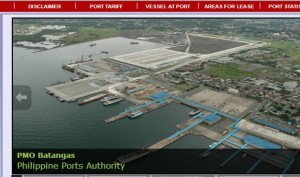Ports told to prioritize release of food shipments
The Philippine Ports Authority (PPA) has ordered the two Manila port operators to prioritize the release of food shipments to help keep prices of basic goods steady, a statement on Friday showed.
The order, limited to containers cleared by the Bureau of Customs, was aimed at addressing the looming food shortage in Metro Manila and comes as the PPA and the operators move to de-clog the ports.
PPA General Manager Juan C. Sta. Ana said in the statement that some of the food products were about to expire as the congestion extended the delivery time of the shipments.
“Congestion continues to decline at the Ports of Manila but we cannot wait until condition normalizes before delivering these food items,” Sta. Ana said.
“The marching order of the Cabinet Cluster on Port Congestion is to prioritize food items and shipments first in-first out and address food shortage as well as the inflation effect of the congestion,” he added.
“Likewise, we are asking the shipping lines to also prioritize food items first in hauling cargoes currently stacked at different foreign ports,” Sta. Ana said.
He said that the two port operators had designated dedicated areas for food shipments inside their ports to prolong the storage period of the items while waiting for Customs clearance and delivery.
Initial estimates showed that a fourth of the containers currently piled up at the two Manila ports—composed of the Manila International Container Terminal (MICT) and the Manila South Harbor (MSH)—were filled with food items while about a fifth of the cargoes in Hong Kong, Taiwan and Singapore were food products.
Following food items, PPA, MICT operator International Container Terminal Services Inc. and MSH operator Asian Terminals Inc. will ship out boxes containing ingredients of other consumer items, again to reduce the inflationary effects of congestion to the market prices of consumer products.
Currently, congestion at the Ports of Manila continues to decline with yard utilization almost down to the desired level of 80 percent, the statement showed.
The Cabinet Cluster on Port Congestion also continues to find ways on how to further decongest the ports, including the opening up of additional empty container depots with close proximity to the Manila ports including a 10-hectare empty lot inside the CCP Complex to temporarily house empty containers bound to be collected by the international shipping lines.
The CCP depot will only be operated from 12 midnight to 5 a.m. to allow the free flow of trucks to and from the area.
The facility will be maintained by ICTSI and Asian Terminals, the statement showed.

